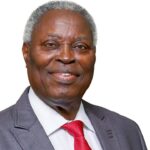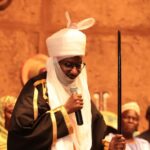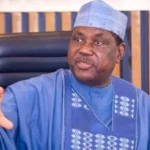Genres of historical writing like biographies and autobiographies are often just as much about the subject as about the wider social contexts within which they lived, thrived or whittled. As the personal is also social, as Marx said, the life of one individual can tell the story of a nation, or a part of it.
Professor Adamu Baikie, who clocked 90 years today, is well known as a world-class scholar, educator and university administrator. But his life also offers a prism through which we can glean the crisis of collective identity that has engulfed northern Nigeria in the past two decades or so. This identity crisis has had devastating consequences for Northern Nigerians, at home and in their relationship with the rest of Nigeria—a country where politics remains firmly regional.
Once the pivot of power in the country, the fortunes of the north are in their lowest ebb since at least 1905, when, following British conquest, the region became first a separate and later in 1914 a constituent part of Nigeria. The region is right now fiercely at war with itself on three fronts: insurgency, banditry, and communal conflicts. In each, northerners are both the victims and also the perpetrators.
On top of these, today’s northern Nigeria is plagued by worsening poverty, stratospheric unemployment, drug abuse, and just about the worst indices of human development ever devised. Many reasons have been adduced for this turn of fortunes, but perhaps the most significant is cultural, not political or economic. The North has simply its sense of self, at least within Nigeria’s political economic milieu.
Baikie is thus a reminder of it all. His life encapsulates a particular mode of being a northerner where being Hausa was not at odds with being Christian, and both perfectly harmonized into an ideal identity that was yet realized in everyday personal, social and professional life of service to region, country and God.
“In all the places I served as vice chancellor” he once told this newspaper, “I put three things into my head, namely, God, the North and my family. These were my guiding principles. I worked to make sure I did not disappoint the people who sent me there and the people I represented”.

How many ‘northerners’ in public service or not, have the ‘north’ as Baikie conceives it here, in their thoughts today? It is this aspect of being a northerner, above all, that his 90th birthday reminds us all.
Baikie was born in Wusasa, Zaria in 1931 but grew up in the Sabon Gari area of Kano. Following primary education in this Kano in the late 1930s, he attended the Middle School in Wusasa, Zaria, graduating in 1948. His illustrious teaching career began in Gusau in 1951, after three years of teacher-training education. Through a Northern Nigeria government scholarship in 1957, he returned to Zaria again for a five-year ‘diploma’ at the Nigerian College, and upon graduation in 1962, was recruited by then newly created Ahmadu Bello University (ABU), Zaria. In between teaching and postgraduate study in the United States in the ensuing years, he became the first professor of education in the North in 1971.
Most of Baikie’s life was therefore formed by two environments that were not only hubs for then still emerging regional colonial economy, but also for forging that broader northern identity of old. Wusasa evolved first as a compromise settlement between the then Emir of Zaria and some of the early missionaries in northern Nigeria, led by Dr Walter Miller, who would also later set up in Kano.
The Zaria Emirate had initially accommodated Miller and the missions within the city walls and allowed them to continue their proselytizing activities among then adherents of traditional religions. But the Emirate soon frowned at Miller’s strategic targeting of Muslims for conversation to Christianity, and in a demonstration of religious tolerance uncommon even in Britain of the day, the Emirate gave the missionaries land outside of the city. Saint Bartholomew Anglican Church, Wusasa, the first ever of its in northern Nigeria, grew out of that compromise in 1929, around the same time the first mosque was erected in London (1926).
Thus, in the 1930s and beyond, Wusasa flourished and would bequeath to the North and Nigeria such eminent sons and daughters as Aliyu Barau Dikko, Yakubu Gowon, Ishaya Audu, Rhoda Mohammed, among many others. Their Muslim or Hausa names were no coincidence either, as this formed part of their very northern identity which, for themselves and for the rest of society, did not conflict with their Christian faith.
As Daily Trust columnist and former Executive Director of the Centre for Democracy and Development (CDD), Prof Jibrin Ibrahim, describes it, growing out of this setting was much the same as growing out of anywhere else in the North. “Now the church, is what we call a Hausa Anglican church in which the language of worship is Hausa and the culture Is Hausa, the religion is Christianity, what that meant was we had a very open notion of what this northern Nigerian identity mean. Central to that identity for us was that it must be an inclusive northern Nigeria, and that was our understanding of the NPC of the First Republic in terms of its approach to defining a northern Nigeria.”
Dikko, in particular, was a founding member of the Jam’iyyar Mutanen Arewa (JMA), a cultural association of northerners that soon morphed into the Northern People’s Congress (NPC) on the eve of self-government. But the ‘Mutanen Arewa’ in the JMA is instructive in itself: it was not just a name, but an acceptance and expression of a common identity, a common culture, and a common destiny for all northerners of the day. That is why the JMA could swiftly metamorphose into the region’s foremost political organization in competition with others of its kind across the country.
And as Baikie himself recalls, Sabon Gari, too, was formed through a similar process: “When the trains started going to Kano and there was influx of people from the South to the city, the then Emir did not send them away. He carved a place for them; that is why we have Sabon Gari, Kano, largely dominated by southerners.
“Interestingly, most of the Yoruba that went to Kano were Muslims and were also given another area. This is why we have Unguwan Ayagi in Kano today. So, you can see how these people were accommodative without religious or ethnic discrimination. In fact, the first deputy Wakilin Waje Kano was an Igbo man. His name was Mr. Egbe. He was turbaned by the Emir at the palace”.
Moreover, it was in Kano that Baikie learned what it used to mean to be a northerner in the sense under consideration, and from none other than his own father. As he retold it to the younger generations in the same interview above: “When my father joined the Kano Native Authority in the late 1920s, he was known to be a Christian. He had his tribal marks, and as such the people he was working with knew his tribe. Despite that, he turned out to be one of the best workers the then Emir had.
“My father worked with Galadiman Kano and Emir Abdullahi Bayero. He was very well known and liked at the same time. They knew his religion but never discriminated against him… Whenever we went to see our father in the office, nobody discriminated against us. Because of our visits to the palace, we knew some of the Hakimai (district heads). In fact, we even visited the Emir himself because our father usually sent us with Christmas cake to him. So, he did not have any problem at all as a Christian working in the palace”.
In other words, even though his father originally hailed from somewhere in present-day Borno State, he and his children were accepted as Kanawa and Hausa, itself a cultural marker that went much beyond any specific ‘tribe’, language or faith in the northern Nigeria of Baikie’s youth—and long after. His first encounter with the late Sardauna while at the Nigerian College brought this home and remained fresh in his mind. In his own words:
“We didn’t know any other person than Sardauna Ahmadu Bello, the then Premier of the Northern Region. There was absolutely no issue of religion, tribe or any other sentiment. When we were in the Nigerian College, all the northern students, irrespective of where they came from, were on the northern Nigerian scholarship. I was the president, Northern Students Association, so I was responsible for ensuring that the allowances were paid.
“I was the one who checked the list, and if I certified the list, the payment would be effected. So there was no discrimination at all. I can remember that when there was a strike at the Nigerian College, Sardauna came down to Zaria with his top ministers like Isa Kaita, Makaman Bidda, Ibrahim Gashash, Abba Habeeb, among others and asked for the leader of the northern students. And I was the one. We sat together and he asked us about our welfare and other things. He also advised us not to isolate ourselves from other students from other parts of the country.”
That northern sense of self was no accident of history or culture. It was adroitly devised and cultivated for most of the preceding century by far-sighted leaders of the region, chief among them, the late Sardauna of whom Baikie and nearly all northerners of his generation still talk about with both gush and regret in their voice.
What Sardauna and his associates did—and the northern Emirs before them—was to give everyone in the north a sense of self they could, with pride, claim as theirs; and share as one with others, from Maiduguri to Ilorin, and from Sokoto to Lokoja, regardless of creed or tongue. After all, social identity is primarily an ideological project which leaders with skill everywhere have used to hold disparate groups of people together as one.
That northern identity has all but vanished today. And yet, Baikie’s life which we celebrate today teaches us that we must reclaim it if the region must remain at peace with itself within a wider Nigerian politics that has only grown much harsher. What changed along the way? How did the change happen? And how can the past be reclaimed to reshape the present and the future?
These are sociological questions for which no easy answers exist. But we must try. The north has always had its socio-economic disadvantages, especially in the area of education, which Baikie and others sacrificed their whole lives to redress. The region has also always been politically divided, as exemplified by the fierce ideological battles between the Northern Elements Progressive Union (NEPU) and the Northern Peoples’ Congress (NPC) in both the regional capital in Kaduna, and the federal centre in Lagos in the 1950s and early 60s.
But despite its socio-economic disadvantage and political division, the idea of northern Nigeria that was handed down up to the 1980s, and which generations of northerners before then strove all their lives to uphold, always had ambition, both for itself and in relation to the rest of Nigeria. That ambition was to remain one and build from the ground up.
A clear sense of self, an identity, is, of course, sine qua non for any social progress. The North’s real strength was always in its identity: its cultural harmony in diversity was a source pride at home and of envy beyond. If the north faces daunting challenges today across every facet of life, and it does, it is because that ambition, that collective sense of a shared purpose has broken down, and with it everything else. It simply no longer means the same to be a ‘northerner’ as it did only a generation or two ago.
But if this points towards what has changed, it does not say much about how the change has occurred, nor to a possible remedy. For these, we may have to look farther. In his Stories, Identities and Political Change (2002), the American Sociologist, Charles Tilly makes the important point that a given social identity, however long established, can change quite quickly once political opportunities shift to a different direction.
This happens, Tilly says, because social and political identities are sustained or turn apart by what he calls “stories”, that is, the narratives members of a given collective—however large or small—tell themselves about ‘we’ and ‘them’. Once the stories change, everything else changes with it, and tonight’s brothers would suddenly turn strangers by morning. This is precisely what the philosopher and Nobel Laureate for Economics, Amartya Sen calls ‘imagined singularity’ in his Identity and Violence: The Illusion of Destiny (2002).
As Sen recollects of his own 1940s India that he witnessed, “with the bewildered eyes of a child—the massive identity shifts that followed divisive politics. A great many persons’ identities as Indians, as Asians, or as members of the human race, seemed to give way—quite suddenly—to sectarian identification with Hindu, Muslim, or Sikh communities. The same people were suddenly different”, as people were made to “discover” their new identities without much critical examination.
This process by which a broad-based social identity such as ‘Indian’ suddenly splinters—another sociological term—into several narrower identities occasioned by changing social and political narratives was replicated in many different parts of the world in the past century: Ireland, Lebanon, the former Yugoslavia, and nearer home in Rwanda, where the same social groups who had shared the same small parcel of land for centuries and were deeply linked by similar culture and intermarriage, suddenly turned different people—and in each case, with serious consequences.
With complicated local inflexions, this is also the story of northern Nigeria in the past two decades or so. To be a northerner for much of the 20th century was to belong to a cultural and political community in which you were one with others across the entire region, regardless of creed or tongue. By the late 1970s however, and particularly in the 1990s onwards, this broad-based northern identity began to crack, and in the wake of the Sharia riots of the early 2000s, it splintered into pieces.
Cultural categories such as ‘the core North’, ‘the Muslim North’, ‘the Middle Belt’ (read the Christian North), ‘Southern Kaduna’, ‘indigenes’, ‘settlers’, and so on, began to float freely in everyday social and political discourses as new referents for the same people who only a generation ago ‘northerners’ or quite simply Hausa would suffice. The change in the stories about identity which these new referents suggest was not overnight or as dramatic as elsewhere, but the outcomes have been much the same.
The sociological—and historical—lesson is clear. Whenever the stories that sustain a broad-based identity change, the identities shift or splinter. And when a broad-based identity splinters, violence follows. But in this case, there was a further splintering of the splinted: Muslim was not enough: ‘Izala’, ‘Dariqa’, or ‘Shiite’ mattered too, that is, the further splintering of the splinted, leading all the way to Boko Haram. The rest is history still present.
The precise moment at which this change occurred is difficult to locate, and the factors which inform it rather quite complicated, but recent work by Nigerian sociologist, Ebenezer Obadare provides a few pointers. In Pentecostal Republic: Religion and the Struggle for State Power in Nigeria (2018), Obadare makes three interesting arguments beyond his overall point that there has a been a ‘Pentecostal domination’ of Nigerian politics since return to democracy in 1999.
First, Obadare says, Pentecostal Christianity in Nigeria saw the whole debate about Sharia in many northern states as a political and cultural affront, and mobilized all rhetorical resources to cast Muslims off as a religious ‘Other’ to be kept at arm’s length. Second, Obadare argues, Muslims responded by adopting the same scaremongering tactics. All these, he concludes, “‘provided an impetus for Muslim revivalism and charismatisation”, which strengthened Islamic politics but also pushed it towards uncharted waters like Boko Haram.
Obadare’s work suggests that Muslim clerics were responding to political action by Christian Pentecostalism. He would have been just as correct if he said it was the other way around. By the late 1980s and early 1990s in many northern towns and cities, there had sprung up all sorts of Muslim religious revisionism that redefined who was a Muslim and who was not. The language of this debate was intense, unguarded, and often quite out-rightly dangerous and inciting. This was a wholly internal Muslim affair, but it would alarm any neighbour. The adoption of Sharia by many northern states, though coming out of a separate impulse, became the high point of this Muslim revivalism.
In other words, the ideological clash and subsequent changing narratives between what and how Christians and Muslims thought of each other in Nigeria during this period was the beginning of the end for the broad-based northern identity that Baikie and his generation knew. It was also what the late Sardauna strove all his political life to avoid, because he knew, and knew again, that once you found a religious crack in the northern firewall all else would be lost. That crack is now a chasm which cities like Kaduna and Jos bring to sharp relief every day.
Can this wide chasm ever be bridged again? Could the north that Baikie and others knew, and served, ever be reclaimed? And how? As Professor Adamu Baikie enters into his tenth decade on earth, no doubt these questions would trouble his mind. But perhaps they should trouble the minds of the younger generation more.

 Join Daily Trust WhatsApp Community For Quick Access To News and Happenings Around You.
Join Daily Trust WhatsApp Community For Quick Access To News and Happenings Around You.


